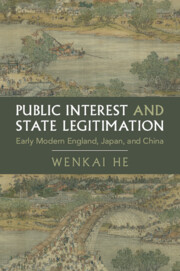Book contents
- Public Interest and State Legitimation
- Cambridge Studies in Historical Sociology
- Public Interest and State Legitimation
- Copyright page
- Dedication
- Contents
- Acknowledgments
- Introduction
- Part I Sources of Early Modern State Resilience
- 1 Legitimacy and Resilience of the Early Modern State
- 2 State–Society Collaboration against Subsistence Crisis
- 3 Financing Public Infrastructure
- 4 The Negotiation of State and Society over Redress of Grievances
- Part II The Emergence of Modern Politics
- Bibliography
- Index
1 - Legitimacy and Resilience of the Early Modern State
from Part I - Sources of Early Modern State Resilience
Published online by Cambridge University Press: 17 November 2023
- Public Interest and State Legitimation
- Cambridge Studies in Historical Sociology
- Public Interest and State Legitimation
- Copyright page
- Dedication
- Contents
- Acknowledgments
- Introduction
- Part I Sources of Early Modern State Resilience
- 1 Legitimacy and Resilience of the Early Modern State
- 2 State–Society Collaboration against Subsistence Crisis
- 3 Financing Public Infrastructure
- 4 The Negotiation of State and Society over Redress of Grievances
- Part II The Emergence of Modern Politics
- Bibliography
- Index
Summary
This chapter introduces in detail the comparability of three early modern states: Tudor and early Stuart England between 1533 and 1640, Tokugawa Japan between 1640 and 1853, and Qing China between 1684 and 1840. Each episode examines governance during a period of relative domestic peace after the state had consolidated its power and established an administrative structure. The early modern state as an impersonal governing apparatus over delimited territory is common to these three cases. Likewise, a public interest-based discourse of state legitimation linked to concrete performance in domestic governance is found in all three states, despite their respective differences in territorial scale, political institutions, and international circumstances. Although each state had a different fiscal basis, state fiscal capacity remained highly limited. Given this constraint, state–society collaboration was key to attaining good domestic governance; and the norm of state responsibility for the public interest facilitated such collaboration to the benefit of both state and society. The chapter discusses under what conditions such state–society cooperation failed, showing the limits to the resilience of the early modern state.
Keywords
- Type
- Chapter
- Information
- Public Interest and State LegitimationEarly Modern England, Japan, and China, pp. 37 - 68Publisher: Cambridge University PressPrint publication year: 2023

